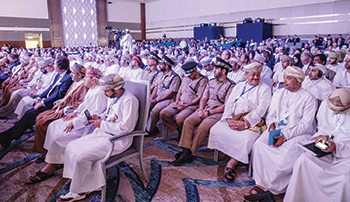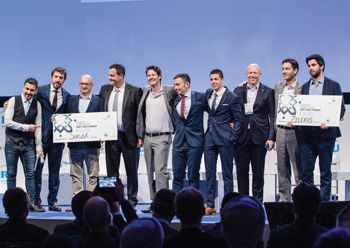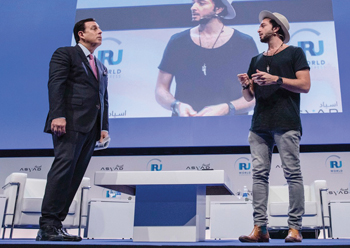IRU Congress moots new transport concepts
01 December 2018
Innovative design and concepts in the road and transport industry were discussed at length over three days at the International Road Transport Union (IRU) World Congress held in Muscat, Oman, last month (November 6 to 8).
Co-hosted by Asyad, a comprehensive end-to-end logistics provider established in 2016 to implement the National Logistics Strategy as mandated by the Omani Government, the action-packed event has put Oman on the world map of transport, writes ABDULAZIZ KHATTAK of Gulf Construction magazine.
This year’s event was themed ‘Innovation on the Move’ and was attended by 1,000 attendees from more than 100 countries and featured over 60 high-level speakers including ministers, CEOs and thought-leaders driving debate on trade and innovation, in the region and beyond.
 |
|
The audience at the IRU World Congress in Muscat, Oman. |
Sayyid Asa’ad bin Tariq Al Said, Deputy Prime Minister for International Relations and Cooperation Affairs and Personal Representative of His Majesty Sultan Qaboos bin Said, inaugurated the congress at the Oman Convention and Exhibition Centre.
In his opening speech, Christian Labrot, president of IRU, said the congress was being held at a time when the world was witnessing straddling of new global trading routes, impacting the movement of people and goods, in addition to the rapid innovation taking place in the road transport sector as a result of the industry becoming increasingly digital, connected and automated.
A research report commissioned by IRU entitled ‘The Future of Road Transport’, which was distributed during the event, shed light on the challenges and opportunities faced by those on the front line.
According to the findings, the global demand for road transport is on the rise, and by 2030, road transport is expected to move 31,000 billion tonne km globally and up to 51,000 billion tonne km by 2050.
It said 48 per cent of transport companies in Asia see climate and environmental change as a significant threat, while 57 per cent viewed geopolitical uncertainty as the biggest threat facing road transport. Some 48 per cent of those surveyed in Europe cited overregulation as one of the top three biggest threats to their business.
 |
|
The start-up competition at IRU World Congress ... $100,000 up for grabs. |
The report also said one in five transport companies globally believe automation and telematics are the biggest innovation opportunities for world transport.
For 20 per cent of the transport companies in the GCC, safety and automation are the biggest opportunities in innovation and technology across all regions.
The IRU World Congress deliberated how policy makers would be able to keep pace with the rapid changes in the logistics technologies, how to adopt them with applicable laws and policies, and how the next-generation platforms will change the labour laws in road transport sector.
Roundtable sessions tackled future technologies and a number of hot topics including data management and analysis, enhancing competitiveness with infrastructure development and new intermodal connections, designing the future workforce, adopting next generation platforms, enabling trade facilitation and increasing fuel efficiencies.
Some notable speakers included Jose Manuel Barroso, chairman of Goldman Sachs, and former European Commission president; Nick Earle, senior vice-president of Virgin Hyperloop One; André Borschberg, pilot, explorer, co-founder of Solar Impulse; Rand Hindi, an artificial intelligence specialist and CEO of Snips; and Fabien Nestmann of Volocopter, among many others.
William Barenberg, executive vice-president and chief revenue officer of Manufacturing & Supply Chain at Octal, the world’s largest PET sheet producer and leading integrated packaging company, said it was about time the Middle East deployed smart and effective transportation and logistics systems, which are increasingly becoming the backbone of the world economy.
He said the core challenge for organisations and policymakers is to understand the true value and impact of sustainable transport, logistics local service models.
Futurist and innovation expert Jim Carroll shared extensive knowledge and insights into the cutting-edge trends of our time to assist businesses and governments to pursue fast-paced innovation, and navigate rapid business model disruption and change.
Author, logistics expert and lecturer Mark Millar said: “After three decades of globalisation, many companies expect their supply chains to shorten in the years ahead. But while some manufacturing processes will migrate ‘closer-to-home’, speeding the shift towards regionalisation, numerous well-established and finely-tuned supply chains will remain in place, adapting to serve expanding local markets. For businesses, supply chains may be shrinking, but the era of complex supply chain ecosystems is still far from being over.”
Also in focus was autonomous road transport, responding to new challenges in urban mobility, and reaping the benefits of innovative practices that can generate new revenue streams and optimise resources.
Key agreements were signed at the congress, including a declaration between IRU, the guardian of the International Transport of Goods Under Cover of TIR Carnets (TIR Convention) under the UN mandate, Mwasalat, Oman’s national transport company, and the Royal Oman Police Directorate General of Customs.
This reaffirmed the sultanate’s commitment to boosting trade across its borders and working in partnership to bring the globally applicable international customs transit and guarantee system to Oman.
Also discussed and signed in a closed ministerial dialogue was the Muscat Compact, a roadmap for the future of road transport, mobility, trade and logistics. The compact focuses on four key elements: talent, trade, environment and innovation. It spurs collective action and guides public-private collaboration at a local, national, regional and global level.
Governments from 25 countries came together to plan a course of action to achieve industry objectives and global goals, notably as set out in the UN 2030 Agenda for Sustainable Development and the Sustainable Development Goals (SDGs).
In addition, Mwasalat signed a MoU)with Busworld, the biggest bus and coach exhibition in the world, to host the event for the first time in the Middle East in Muscat in 2021.
Meanwhile, six finalists faced the judges in a start-up competition aimed at mobility, transport and logistics. The jury awarded a $100,000 investment prize, which was split between CargoX and Zeleros Hyperloop.
- Smart, green products in focus at top show
- IRU Congress moots new transport concepts
- Euro Auctions gets ready for Dubai sale
- Diary of events



